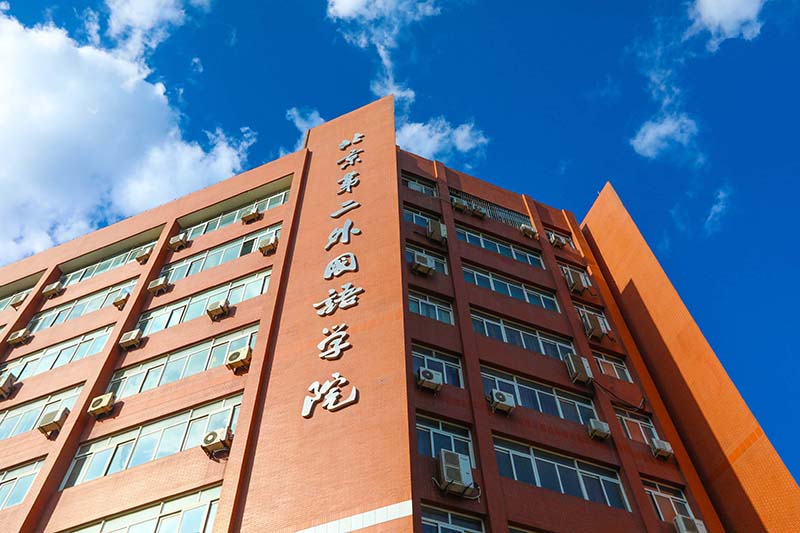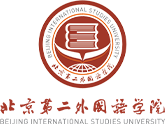

Beijing International Studies University [Photo provided by bisu.edu.cn]
Beijing International Studies University (BISU) is a distinguished institution of higher education jointly established by the Ministry of Culture and Tourism and the Beijing Municipal People's Government. It is a high-level specialized university renowned for its foreign language programs at the core, tourism studies as its distinctive feature, and the coordinated development of multiple disciplines. BISU serves as a crucial national base for cultivating talents and conducting research in fields such as foreign languages, translation, tourism, economics, and trade.
Initiated by China's late Premier Zhou Enlai, BISU was founded in October 1964 on the basis of the former School of Foreign Language Cadres of Xinhua News Agency. It was one of the first institutions in China authorized to enroll undergraduate students. Throughout its history, BISU has been administered successively by the former China International Cultural Liaison Commission, the Ministry of Foreign Affairs, the Beijing Municipal People's Government, the Ministry of Education, and the former China National Tourism Administration. In February 2000, it was placed under the direct management of the Beijing Municipal People's Government. Since March 2022, it has operated under the joint leadership of the Ministry of Culture and Tourism and the Beijing Municipal People's Government.
Since its establishment, the university has adhered to its motto of "Integrity, Diligence, Truth, and Leadership", fostering the academic ethos of "Integrating Chinese and Foreign Perspectives, Combining Knowledge with Practice" and the teaching philosophy of "Harmonious Interaction to Inspire Thinking, Humanistic Education to Cultivate Character". Eminent pioneers of New China's translation field, including Li Yueran, Su Qi, Zhou Xiqing, Dong Leshan, Guan Zhenhu, Li Chuansong, Wang Zhiyou, Wang Wenjiong, and Shu Yu, have taught and contributed their expertise here. Tens of thousands of graduates from BISU are active across China and around the globe, with many achieving prominence. Distinguished alumni include:
Wang Yi, a member of the Political Bureau of the Communist Party of China (CPC) Central Committee, director of the Office of the Central Commission for Foreign Affairs, and minister of foreign affairs;
Gao Hucheng, former minister of commerce;
Liu Hongcai and Xu Luping, former vice-ministers of the International Department of the CPC Central Committee;
Cheng Guoping, former vice-minister of foreign affairs;
Chen Jian, former vice-minister of commerce;
Wu Sike, China's former special envoy on Middle East affairs;
Chang Zhenming, former secretary of the CPC CITIC Group Committee and chairman of the group;
Jiang Bo, former vice-president of Tongji University;
Liu Shijun, vice-chairman and secretary-general of the World Tourism Alliance.
These alumni have distinguished themselves in politics, diplomacy, business, culture, and education.
Located in Beijing's Chaoyang district, the campus borders the Central Business District (CBD) to its west and is adjacent to the Beijing Municipal Administrative Center to its east. The university comprises 16 academic units:
School of English Language, Literature and Culture;
School of Japanese Language, Literature and Culture;
School of Asian Studies;
School of European Studies;
School of Middle Eastern Studies;
School of Interpreting and Translation;
School of Tourism Sciences;
Business School;
School of Economics;
School of Country and Region Studies;
School of Culture and Communication;
School of Artificial Intelligence and Language Sciences;
School of International Education;
School of Marxism Studies;
Department of Physical Education;
Department of Basic Sciences.
BISU has nearly 10,000 registered students enrolled in various programs, including over 6,300 undergraduate students, over 1,800 graduate students, over 700 international students, and over 300 students in integrated programs. The faculty and staff number nearly 1,000, including:
Two National-Level Excellent Teaching Teams;
One National Huang Danian-Style Teaching Team;
Four Beijing Municipal-Level Excellent Teaching Teams;
Three Recipients of National-Level Talent Programs;
Two Recipients of the Lifetime Cultural Achievement Award in Translation.
There are also over 40 recipients of various provincial/ministerial-level talent distinctions, including the Ministry of Education's Program for New Century Excellent Talents, the Ministry of Education's Overseas High-Level Talent Recruitment Program, Beijing Overseas High-Level Talents, and Eminent Translators.
Additionally, the university employs over 130 part-time professors and industry mentors, alongside more than 50 foreign experts.
BISU offers:
48 Undergraduate Programs (including 31 foreign language programs);
Six First-Level Disciplines authorized to confer Master's Degrees;
30 Second-Level Disciplines authorized to confer Master's Degrees;
Seven Professional Master's Degree Authorization Points;
One Joint Doctoral Training Program (in collaboration with the Silk Road International University of Tourism and Cultural Heritage);
Two Postdoctoral Research Workstations (jointly established with Social Sciences Academic Press (China) and Capital University of Economics and Business).
Key disciplines include:
Two Beijing High-Precision Disciplines: Tourism Management, Foreign Languages and Literatures;
Four Beijing Key Construction Disciplines: Foreign Languages and Literatures, Tourism Management, Business Management, International Trade.
Program distinctions include:
15 National-Level First-Class Undergraduate Programs: English, Business English, Japanese, Korean, Russian, German, French, Spanish, Portuguese, Arabic, Persian, Translation, Tourism Management, Hospitality Management, Financial Management;
Four National-Level Characteristic Specialties: Japanese, Arabic, English, Tourism Management;
14 Beijing Municipal-Level First-Class Undergraduate Programs: Hindi, Italian, Hungarian, Serbian, Estonian, MICE Economics and Management, Marketing, Finance, International Economics and Trade, Trade Economics, Chinese Language and Literature, Teaching Chinese to Speakers of Other Languages, Journalism, International Affairs and International Relations;
Two Beijing Key Construction First-Class Programs: Translation, Tourism Management;
One Ministry of Education Comprehensive Reform Pilot Program: Japanese.
Guided by the imperative to serve national strategies and the development of the capital, BISU has built a comprehensive research institution system spanning multiple disciplines. It concentrates its strengths on three university-level research platforms:
China-Arab Center for Cultural and Tourism Cooperation Studies;
Center for Area Studies;
Center for Civilizational Interpretation and International Communication Studies.
The university also houses numerous research institutes, including:
China Research Institute for Cultural and Tourism Industries;
China Tourism Talents Development Institute;
China Service Trade Research Institute (incorporating the Capital International Exchange Center Research Institute and the National Cultural Development International Strategy Research Institute);
Capital Institute for International Cultural Communication;
China Comics and Cultural Innovation Research Institute;
Danish Research Center;
UNESCO Research Center;
China-Japan-Korea Cooperation Research Center;
Peruvian Research Center;
Hellenic Studies Center;
China Public Policy Translation Institute;
Capital Research Institute for Cultural and Tourism Development;
China Big Data Research Institute for Culture and Tourism;
Laboratory for Artificial Intelligence and Language Cognition;
"Belt and Road" Data Analysis and Decision Support Laboratory.
Among these research entities, 11 are provincial/ministerial-level research bases, one is a provincial/ministerial-level collaborative innovation center, one is a Ministry of Education cultivation base for country and area studies, and four are Ministry of Education registered country and area research centers. BISU hosts key academic organizations such as the Beijing Translators Association, Beijing Comics Society, and Beijing Tourism Society. It publishes academic journals including the Journal of Beijing International Studies University (Peking University Core), Arab Studies Series (CSSCI Source Journal), Tourism and Hospitality Prospects, Cross-Cultural Studies, Beijing Translation, and Comics Research.
Leveraging its multilingual strengths, BISU keeps pursuing international exchanges and cooperation, embodying a distinct international character. The university has established comprehensive, multi-level partnerships with over 210 universities and educational institutions across more than 50 countries and regions. It sends numerous faculty members abroad annually for further studies, visiting scholarships, collaborative research, and teaching Chinese as a foreign language. Over 100 foreign teachers and visiting scholars come to teach or conduct exchanges at BISU each year. Approximately 500 BISU students study abroad annually, while the university welcomes over 1,500 international students. BISU has co-established six Confucius Institutes with:
Universidad Autónoma de Chihuahua, Mexico;
University of Central Lancashire, UK;
Université Mohammed V de Rabat, Morocco;
City of Clermont-Ferrand, France;
University of Coimbra, Portugal;
University of Panama, Panama.
The university offers programs like the "An Overview of Modern China and City Development" Summer School and Master's Program, expands the "Study at BISU" initiative for international students, and offers specialized courses on China's national conditions.
Looking towards the future, BISU will steadfastly uphold its mission of "People-to-people Exchange between China and Foreign Countries". It commits to serving national strategies and the development of the capital, guided by the educational philosophy of "Integrating Chinese and Foreign Perspectives, Combining Knowledge with Practice". The university will persist in pursuing in-depth development, strengthening interdisciplinary integration, and dedicating itself to cultivating compound talents with "multilingual proficiency and cross-disciplinary competence", imbued with patriotism and a global vision. BISU strives to become a high-level university of international studies distinguished by its distinct characteristics in "Cultural Exchange for the New Era".
(Data updated to April 2025)

Links
